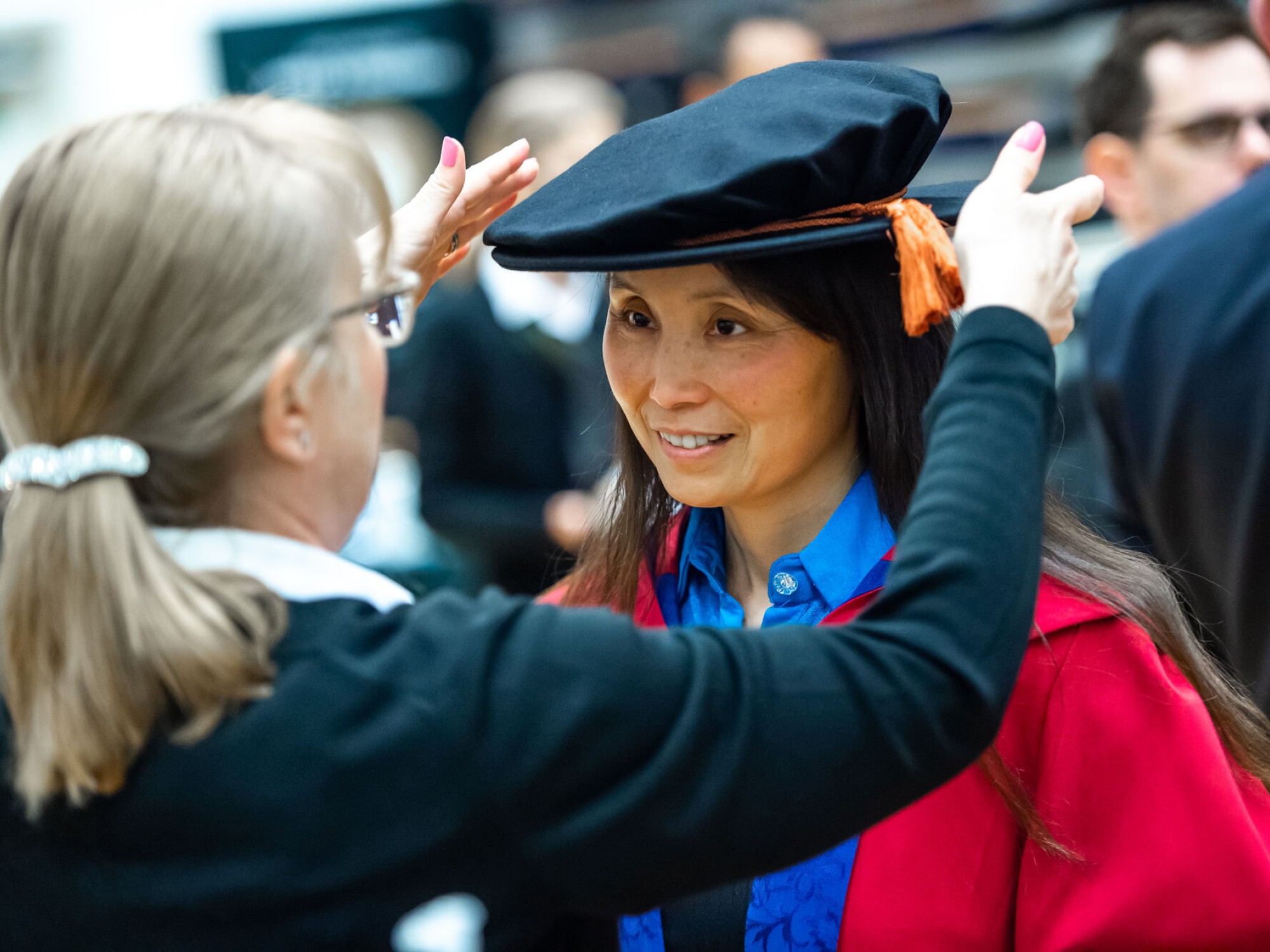
- Hospitality, Tourism, Transport and Events
PhD Hospitality, Tourism, Transport and Events
Our academics shape the agenda for scholarship and practice in hospitality, tourism, events and transport, and carry out cutting-edge research in topics ranging from lifestyle, travel, entrepreneurship, food and culture, to the digital economy and artificial intelligence. We will challenge you with new ideas to develop you as a critical researcher, as well as helping you build a solid grounding in research methodologies.
Why choose this
programme?
- We have an outstanding reputation in the sector and run the largest hospitality, tourism and events PhD programme in the world.
- Surrey Hospitality and Tourism Management is ranked 10th for research outputs with 93% of our research being rated as world-leading (4*) or of internationally excellent (3*) quality by the Research Excellence Framework (REF) 2021. The University of Surrey is 33rd in the REF UK rankings for overall research quality. The University is now also ranked in the top 20 in the UK for the overall quality of research outputs – research papers and other published works.
- We belong to TECHNE, an Arts and Humanities Research Council (AHRC)-funded doctoral training partnership, which provides access to comprehensive academic and professional training programmes, as well as the possibility of funding for your studies.
- We see doctoral students as important collaborators and we aim to connect you with senior executives and policymakers from around the world, offering opportunities for future learning and valuable connections. Watch our video about postgraduate research in Surrey Hospitality and Tourism Management with academic supervisor, Dr Brigitte Stangl, and her PhD student, Lori Hoy, discussing how they work together.
Statistics
2nd in the world
We are ranked 2nd in the world for hospitality and tourism management in the Shanghai Global Ranking of Academic Subjects 2024
1st in the UK
We are 1st in the UK and 15th in the world for hospitality and leisure management in the QS World University Rankings by Subject 2024
1st in the UK
We are ranked 1st for tourism, transport, travel and heritage in the Complete University Guide 2024
What you will study
Our PhD programme takes around three to four years of full-time study. You’ll take on a structured, supervised programme of scholarly research, leading to a thesis that makes an original contribution to the field and is suitable to be published in a series of high-quality, refereed journal articles.
You’ll be assigned two supervisors with expertise in your area; normally one will be an expert in your subject, and one who is an expert in methodology. Your supervisors will guide you through your PhD, from developing your project through to your analysis and writing your thesis. You’ll normally meet with your supervisor every four to six weeks.
There’s no formal teaching as part of your PhD programme, but you’ll benefit from a range of support and learning opportunities in addition to your supervision meetings. These include a tailored weekly programme of formal research training in research methodology and career development. You’ll have the chance to present and discuss your research at our weekly research seminars.
You’ll also be able to take any of our MSc modules and join our range of interactive workshops that run throughout the year, exploring topics such as personal effectiveness, information skills, presenting research and job skills. You’ll also be able to qualify as a Fellow of the Higher Education Academy by completing the Postgraduate Certificate in Learning and Teaching.
We encourage our students to attend international conferences and training courses. We can support your travel costs to these events.
Assessment
Your final assessment will be based on the presentation of your research in a written thesis, which will be discussed in a viva examination with at least two examiners. You have the option of preparing your thesis as a monograph (one large volume in chapter form) or in publication format (including chapters written for publication), subject to the approval of your supervisors.
Location
This course is based at Stag Hill campus. Stag Hill is the University's main campus and where the majority of our courses are taught.
Research themes
Competitiveness of the visitor economy
- Economic modelling and forecasting
- Innovation, entrepreneurship, risk and uncertainty
- Future of work and labour mobility
- Visitor decision-making, behaviour and destination marketing.
Find out more about the Centre for Competitiveness of the Visitor Economy (COVE).
Sustainability and wellbeing in the visitor economy
- Sustainability evidence-based policy making
- Industry’s acceptance of responsibility for sustainable development
- Sustainable development and entrepreneurship
- Sustainable and efficient transportation
- Sustainability marketing, product design and communication.
Find out more about the Centre for Sustainability and Wellbeing in the Visitor Economy (SWELL).
Digital transformation in the visitor economy
- Digital transformation in tourism, hospitality and events, including new media and consumer behaviour, new business models and disruptive innovation, transformation in business operations and performance
- Smart systems in tourism, hospitality and events, including artificial intelligence and robotics, sensors and internet-of-things
- Technology for social good in tourism, hospitality and events, including technology facilitating health and wellbeing, social isolation and loneliness, inclusion and accessibility
- Data science and innovative methodologies in tourism, hospitality and events, including biometric research, data analytics and pattern recognition in big data.
Find out more about the Centre for Digital Transformation in the Visitor Economy (DIGMY).
Discover more about our hospitality, tourism management research.
See a full list of all our academic staff within Surrey Hospitality and Management.
Research support
The professional development of postgraduate researchers is supported by the Doctoral College, which provides training in essential skills through its Researcher Development Programme of workshops, mentoring and coaching. A dedicated postgraduate careers and employability team will help you prepare for a successful career after the completion of your PhD.
Facilities
You’ll be allocated your own office space and computer, and be given access to academic and business databases and a range of online research tools and resources.
Ikram Nur Muharam
Student - Hospitality, Tourism, Transport and Events PhD
"I must say that I am very fortunate to have two supervisors who are not only experts in their fields, but also have warm personalities."


Pablo Pereira-Doel
Student - Hospitality, Tourism, Transport and Events PhD
"The multiculturality at the University of Surrey is great and it is a very welcoming place. After living in London for several years, I really appreciate the quietness of Guildford, while being a stone’s throw away from the Surrey Hills."
UK qualifications
Applicants are expected to hold a masters degree at a minimum of a distinction level in a relevant discipline from an approved university.
If you do not hold such a degree, you may be admitted, providing you hold a first-class (1st) bachelors degree from an approved university or a professional or other qualification deemed by the University to be appropriate.
English language requirements
IELTS Academic: 7.0 or above with a minimum of 6.5 in each component (or equivalent).
These are the English language qualifications and levels that we can accept.
If you do not currently meet the level required for your programme, we offer intensive pre-sessional English language courses, designed to take you to the level of English ability and skill required for your studies here.
Selection process
Selection is based on applicants:
- Meeting the expected entry requirements
- Being shortlisted through the application screening process
- Completing a successful interview
- Providing suitable references.
Fees per year
Explore UKCISA's website for more information if you are unsure whether you are a UK or overseas student. View the list of fees for all postgraduate research courses.
* Please note: any start date other than September will attract a pro-rata fee for that year of entry (75 per cent for January, 50 per cent for April and 25 per cent for July).
October 2025 - Full-time
- UK
- £5,006
- Overseas
- £21,800
October 2025 - Full-time
- UK
- £5,006
- Overseas
- £21,800
October 2025 - Part-time
- UK
- £2,503
- Overseas
- £10,900
October 2025 - Part-time
- UK
- £2,503
- Overseas
- £10,900
July 2025 - Full-time
- UK
- £1,197
- Overseas
- £5,250
July 2025 - Part-time
- UK
- £598
- Overseas
- £2,625
January 2026 - Full-time
- UK
- £3,755
- Overseas
- £16,350
January 2026 - Full-time
- UK
- £3,755
- Overseas
- £16,350
January 2026 - Part-time
- UK
- £1,877
- Overseas
- £8,175
January 2026 - Part-time
- UK
- £1,877
- Overseas
- £8,175
April 2026 - Full-time
- UK
- £2,503
- Overseas
- £10,900
April 2026 - Full-time
- UK
- £2,503
- Overseas
- £10,900
April 2026 - Part-time
- UK
- £1,252
- Overseas
- £5,450
April 2026 - Part-time
- UK
- £1,252
- Overseas
- £5,450
- Annual fees will increase by 4% for each year of study, rounded up to the nearest £100 (subject to legal requirements).
Additional costs
There are additional costs that you can expect to incur when studying at Surrey.
Funding
A Postgraduate Doctoral Loan can help with course fees and living costs while you study a postgraduate doctoral course.
Application process
Applicants are advised to contact potential supervisors before they submit an application via the website. Please refer to section two of our application guidance.
After registration
Students are initially registered for a PhD with probationary status and, subject to satisfactory progress, subsequently confirmed as having PhD status.
Apply online
To apply online first select the course you'd like to apply for then log in.
Select your course
Choose the course option you wish to apply for.
Sign in
Create an account and sign into our application portal.
About the University of Surrey
Need more information?
Contact our Admissions team or talk to a current University of Surrey student online.
Code of practice for research degrees
Surrey’s postgraduate research code of practice sets out the University's policy and procedural framework relating to research degrees. The code defines a set of standard procedures and specific responsibilities covering the academic supervision, administration and assessment of research degrees for all faculties within the University.
Download the code of practice for research degrees (PDF).
Terms and conditions
When you accept an offer to study at the University of Surrey, you are agreeing to follow our policies and procedures, student regulations, and terms and conditions.
We provide these terms and conditions in two stages:
- First when we make an offer.
- Second when students accept their offer and register to study with us (registration terms and conditions will vary depending on your course and academic year).
View our generic registration terms and conditions (PDF) for the 2024/25 academic year, as a guide on what to expect.
Disclaimer
This online prospectus has been published in advance of the academic year to which it applies.
Whilst we have done everything possible to ensure this information is accurate, some changes may happen between publishing and the start of the course.
It is important to check this website for any updates before you apply for a course with us. Read our full disclaimer.

